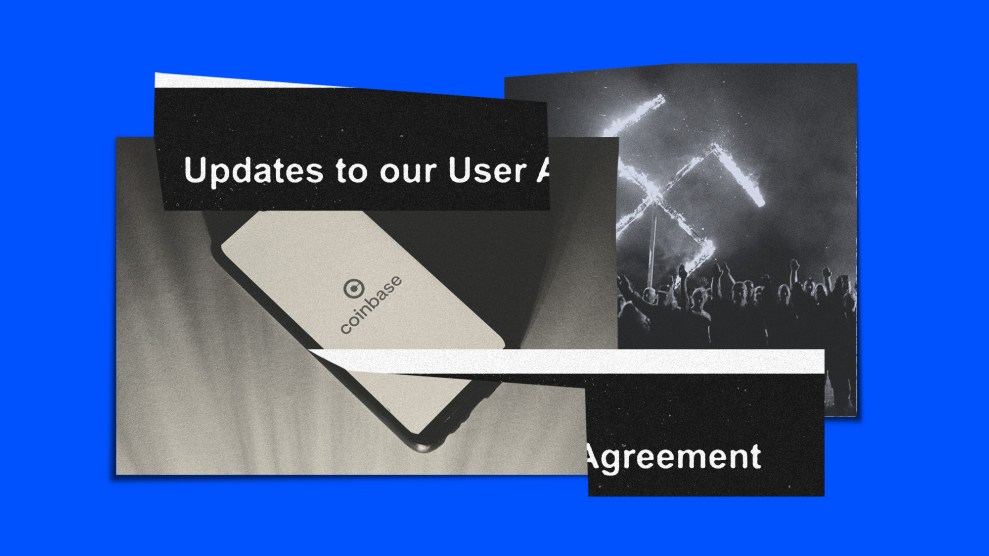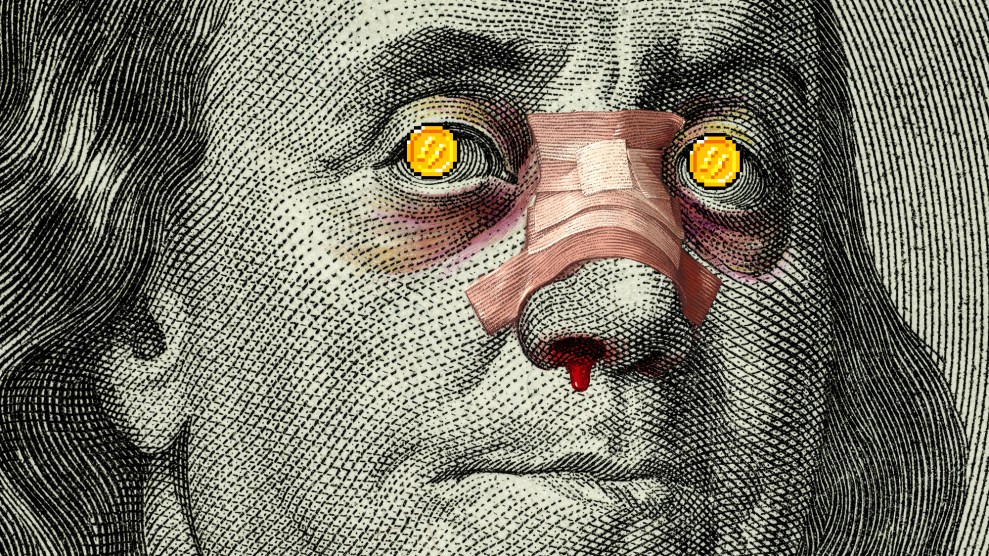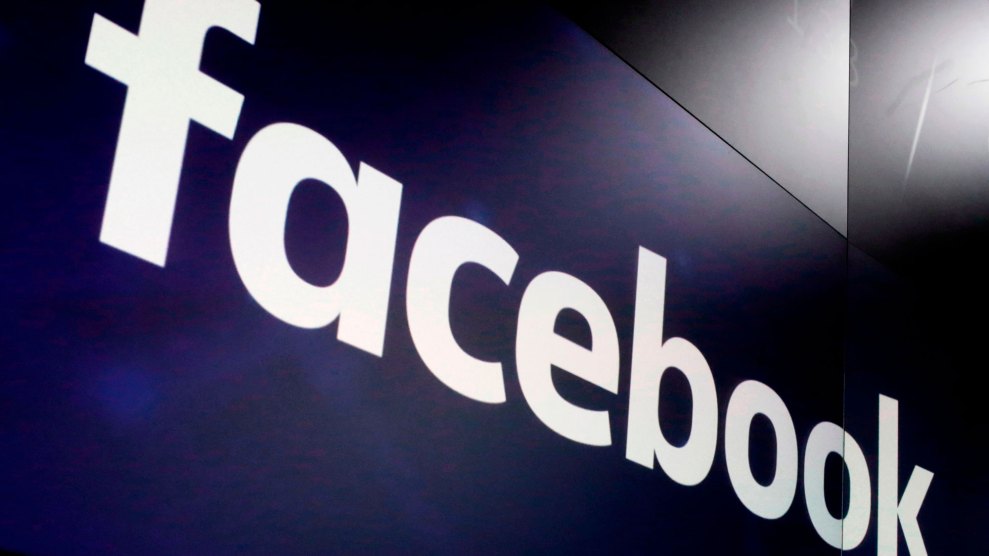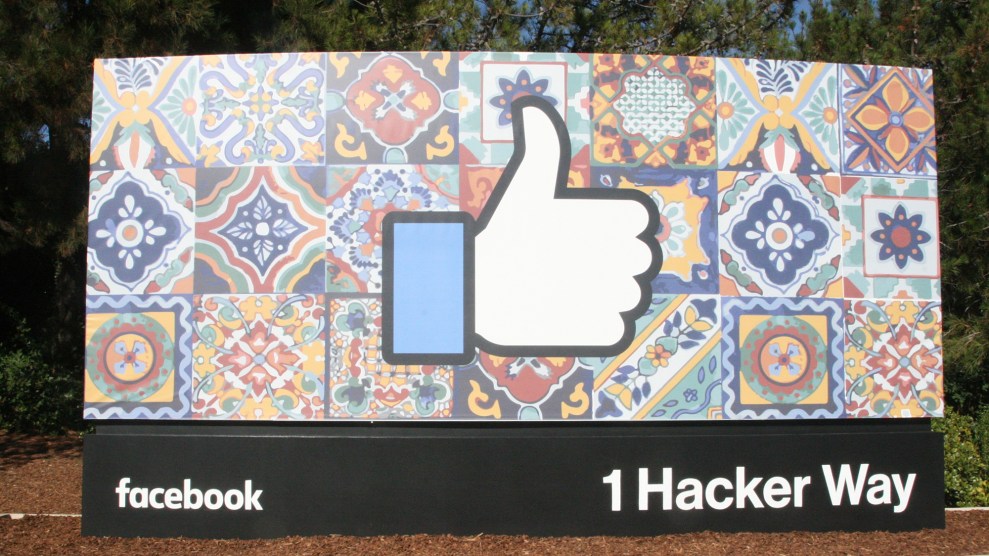
Mother Jones; Nikolas Kokovlis/NurPhoto/Getty; Spencer Platt/Getty
Using Coinbase to facilitate racism and hate is apparently no longer against the cryptocurrency platform’s rules under little-noticed revisions the company made to its terms of service several years ago.
Until August 2021, the “Prohibited Uses” section of Coinbase’s user agreement banned customers from wielding the platform to “incite, threaten, facilitate, promote, or encourage hate, racial intolerance, or violent acts against others.” That month, Coinbase stripped that section from the agreement.
“Coinbase quietly removing hate speech and racism clauses from its terms of service sends a clear message: Coinbase does not care about the safety and well-being of Black people who use their site,” said an emailed statement from Jade Magnus Ogunnaike, a vice president at Color Of Change, a civil rights group focused on inequity and technology. “Without strong content moderation policies, Coinbase will continue to put Black consumers, their own employees and stakeholders in harm’s way in order to enact a long broken vision for Big Tech.”
Coinbase’s move to strip its user agreement of language explicitly barring hate took place about a year after the company, amid national racial justice protests, banned internal discussion of nominally external political issues and promptly faced public accusations of racism from Black employees.
Financial tech companies, including both PayPal and Square, often have language in their user agreement policies banning their use to promote “hate” or “racial intolerance.” White nationalist Richard Spencer, for example, was banned from receiving money on Paypal in 2017 following the violent Unite the Right white supremacist rally in Charlottesville, Virgina. Prominent Islamaphobe Laura Loomer has also been banned from the digital payments platform.
Though white nationalist Nick Fuentes has claimed to be banned from Coinbase, the company is generally mum about its own enforcement decisions. While Lisa Johnson, a Coinbase spokesperson, wrote in an emailed statement that the company would still address hate speech if it was “illegal” or “violent” under its revised policy, the change could mean that white nationalists like Fuentes and others in hate groups will have an easier time staying on the platform.
Natasha Tusikov, an associate professor of criminology at Canada’s York University who specializes in technology regulation, noted that by removing “specific language about prohibiting the incitement of hate and racial intolerance” Coinbase had indicated “that the company doesn’t regard that as important behavior to prohibit.”
Tusikov speculated that Coinbase could have made the move as a political signal to avoid being associated with left politics. “It could be that this is a company that is trying to walk that tightrope,” she said.
Silicon Valley has been widely observed to be drifting rightward. People like Marc Andreessen, one of the tech world’s most famous investors, have been increasingly open to associating with right-wing figures. Balaji Srinivasan —a former Coinbase chief technology officer—has built an enthusiastic social media following routinely decrying wokeness.
Coinbase’s own actions provide some evidence of the shift. In 2020, after a summer of intense racial justice protests set off by the police murder of George Floyd, major tech companies made concessions and overtures to the broader racial reckoning and the ways it rippled inside their own companies. Coinbase decided to go in the opposite direction. “It has become common for Silicon Valley companies to engage in a wide variety of social activism,” CEO Brian Armstrong wrote. “While I think these efforts are well-intentioned, they have the potential to destroy a lot of value at most companies, both by being a distraction and by creating internal division.”
Those words come from a post Armstrong published in September 2020 announcing that Coinbase employees would no longer be allowed to “[d]ebate causes or political candidates internally that are unrelated to work.” The policy was immediately controversial. While some high-profile Silicon Valley figures, like investor Paul Graham and Founders Fund’s Mike Solana, praised the decision, some Coinbase employees and other CEOs, like Jack Dorsey, criticized it. Dorsey did so by arguing that the bitcoin traded on Coinbase are, in themselves, “direct activism against an unverifiable and exclusionary financial system which negatively affects so much of our society” and that internal political conversations provide a forum to connect the company’s work to “the related societal issues your customers face daily.”
In her statement responding to Coinbase’s changes to its user agreement, Ogunnaike also criticized Armstrong’s 2020 policy banning political discussions at Coinbase, highlighting its “conflation of civil rights with ‘politics.’”
Weeks after Armstrong banned political discussions, the New York Times published an article airing complaints by Black employees that Coinbase was a racist workplace. It reported that 11 of the roughly 20 Black people at the company had reported racist or discriminatory treatment to their managers or the human resources department.
An employee described how a manager had implied a Black employee was dealing drugs and carrying a gun. Another said a manager had described Black employees as less capable; one Black worker complained they’d been passed over for promotions in favor of less experienced white employees. As one Black employee who left the company told the Times, “Most people of color working in tech know that there’s a diversity problem. But I’ve never experienced anything like Coinbase.”
















